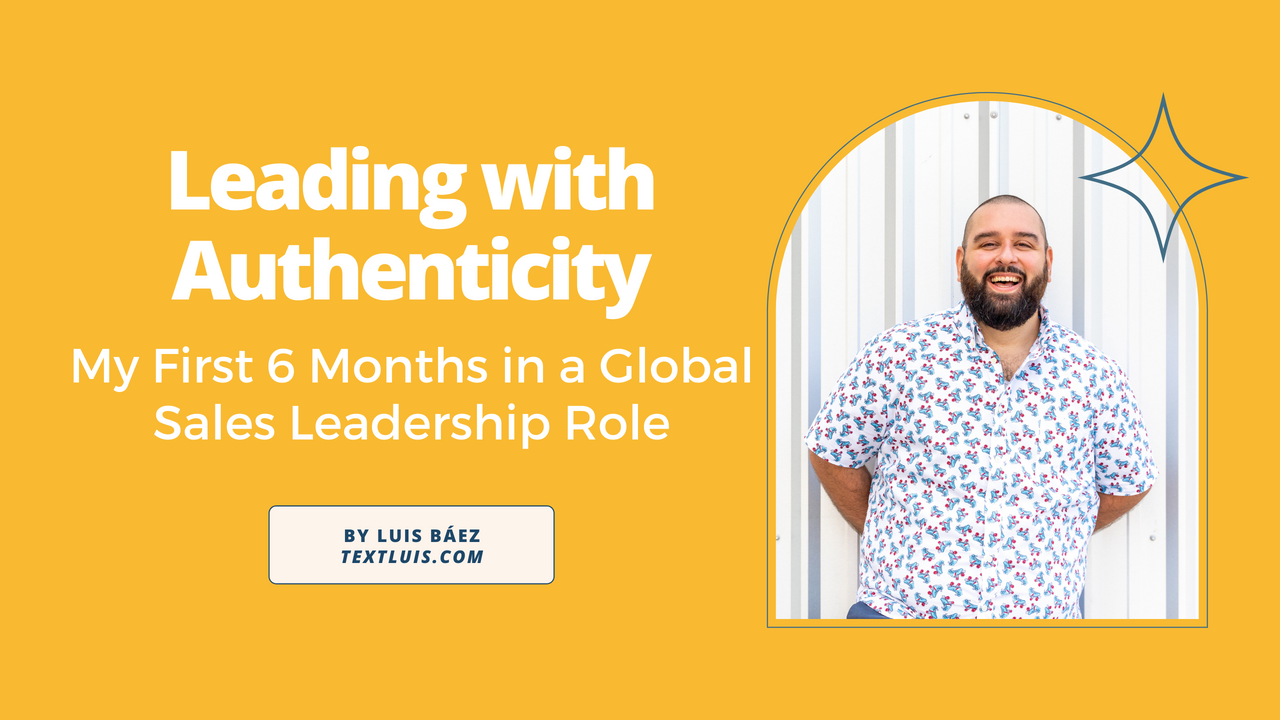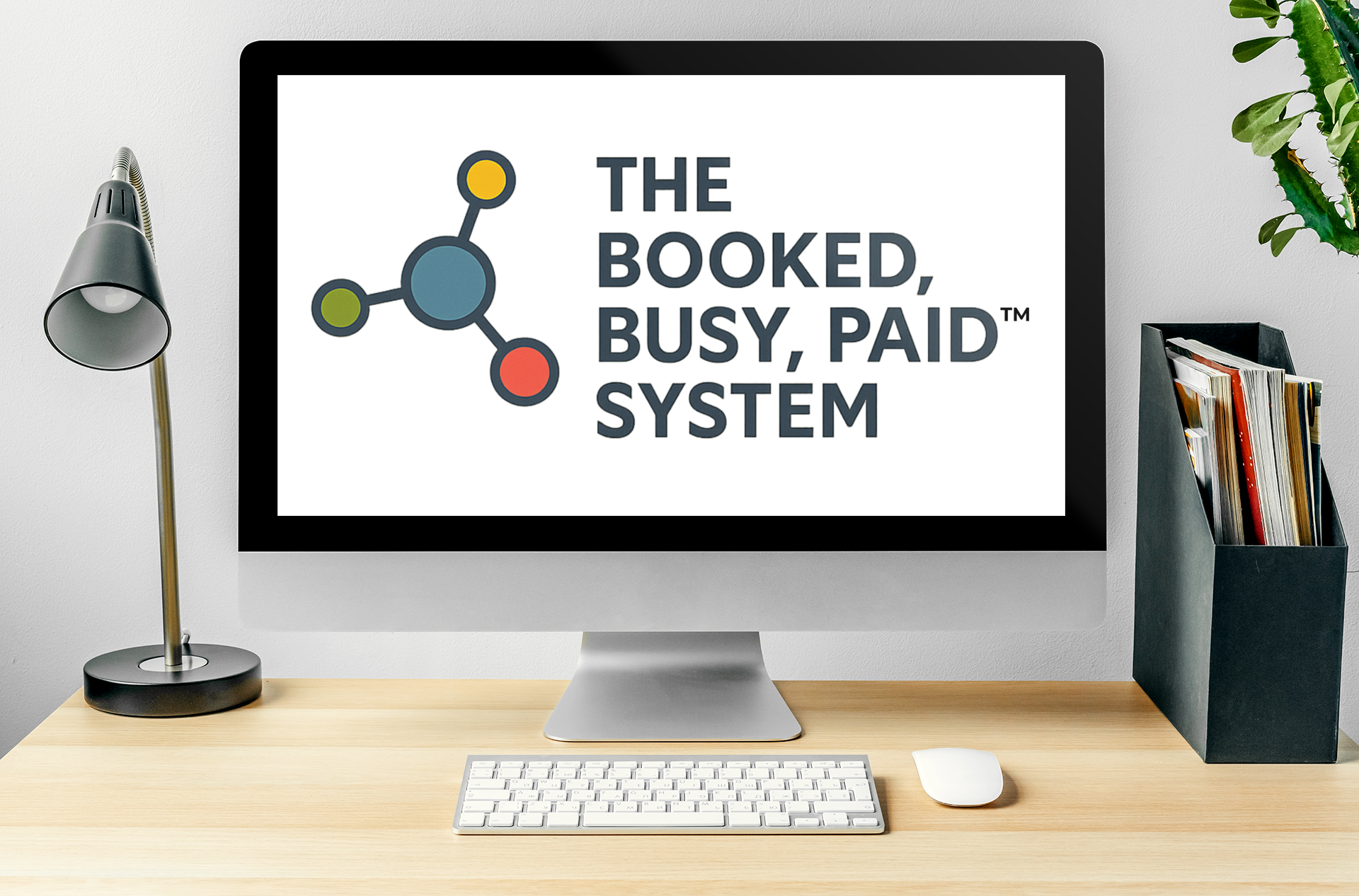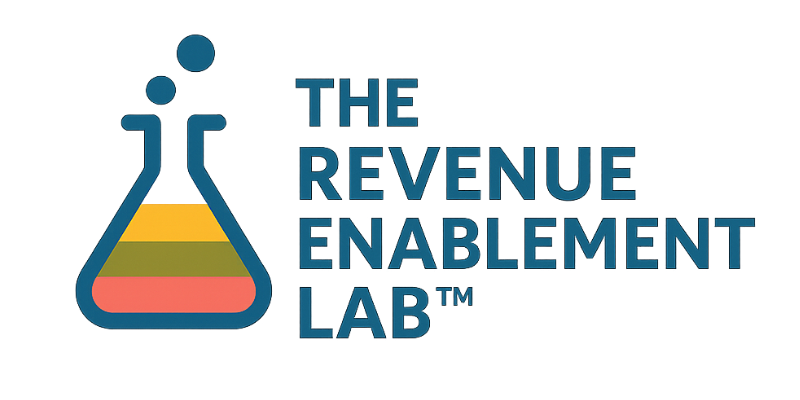Leading With Authenticity: My First 6 Months in a Global Sales Leadership Role
Mar 08, 2022
This article was originally published on LinkedIn.
What’s the best example of leadership that you’ve ever experienced or witnessed at your workplace?
In the Spring of 2012 I moved from New York City to the Bay Area on a whim — no job, no ride, and no network — in pursuit of all the promises and spoils that came with having a job in tech like being able to bring my whole gay, urban, Puerto Rican self to the workplace. That Fall, I was recruited to join the Marketing Solutions team at LinkedIn as an Account Executive under the leadership of then Sales Director, Heidi Anderson, now Chief Revenue Officer at Nextdoor.
Not only was this a dream opportunity, but I had a seat at the table of one of the most influential companies in history. As someone who grew up in poverty and is the first in my family to pursue a corporate career, I was both grateful and eager to prove that I belonged and deserved every perk and benefit.
After years of working in advertising sales in New York City and defending myself against homophobic, sexist, racist, and hypercapitalistic leaders, I walked into my first sales pipeline review meeting at LinkedIn with high anxiety and a stack of bulletpoints ready to justify how I’d been spending my time growing my book of business.
Heidi walked into the conference room, quickly greeted everyone, plugged a connector to her laptop, and she displayed her calendar on full screen. She sat down in her seat, apologized for being 2 minutes late — and proceeded to walk through her list of priorities and meetings for the week.
She didn’t drill us on our numbers.
She didn’t call anyone out for under performance.
She didn’t blame anyone for any shortcoming.
She instead set the tone for the level of transparency and accountability that she expected from everyone on her team — by detailing how she was spending her time, when to expect deliverables, and all the challenges against anything outstanding.
This experience has influenced my leadership style and aspirations for nearly a decade. Now, as I complete my first 6 months as a global sales leader at a billion-dollar scale-up, I reflect on that experience and everything I’ve learned about authentic and transparent leadership since.
In an effort to add to the growing body of contributions by successful and impactful underrepresented professionals, I’m sharing a few strategies from my intrapreneurial playbook, part of a project I’ve been quietly working on. My hope is not only to give people the behind-the-scenes access into this career path like I wish I had earlier in my development, but to also share some of the ways that I’ve expanded my capacity to inspire and influence others to success.
At the top of September 2021, I joined the Global Sales Leadership team at Deputy under the direction and mentorship of Nicole Brambila, Global SVP of Sales. In alignment with our mission to simplify shift work around the globe, my job is to develop, execute, and expand the company’s global Sales Enablement strategy. This includes building a team to lead our training and coaching programs for our Sales Deputies around the world.
The work I do requires developing strong relationships across 3 continents and every function of the business in order to align the support and resources needed for our customers and sales teams to thrive. Leveraging my IQ, EQ, and Cultural Intelligence (the third critical ingredient for success in a global corporate setting that is often overlooked), I have the task of bringing multiple stakeholders together across different countries and functions, and get their buy-in for businesses cases that are aligned with both our company values and revenue targets.
Here are a few of the strategies that helped me quickly stand out across the company, build trust and social equity, and get cross-functional endorsement for the programs and training my team develops around the globe.
Give everyone permission to be authentic
During my first 30 days in this role, I committed myself to listening and synthesizing everyone’s contributions across all regions of the company. In order to make the process both enjoyable and productive, it was important to establish that I am friend, not foe. To get people to be real with me about where the company's growth pains were, I had to set the tone for required realness in my interactions.
For my initial one-on-one meetings with leaders and subject matter experts, I opened the conversation with a clearly articulated invitation to be honest and authentic. I seized the opportunity to make the first remarks and let people know that as a boy from The Bronx, I sit crooked and talk straight. To punctuate this I let people know right away that I was no expert in our business, and admitted that I could not succeed without their collaboration. This was the exact opposite experience people were expecting to have with me, and it was wonderful to witness the relief people felt to have an ally in the company.
In order to bring everyone’s guard down and gain credibility, I had to be willing to be vulnerable and make myself relatable. Gaining their respect began with my acknowledgement that they knew something I didn’t, but to really gain their trust I had to be “Luis the human” not “Luis the global sales leader”.
As a result, all the tea was spilled, and I was able to gather the intelligence and commitments needed to present a strong global strategy and execution plan to senior leadership on Day 31.
Develop a memorable personal brand
One thing that I used to hate hearing from sales leaders and read in business books but I have to admit is true… is that people are less likely to remember what you said than they are to remember how you made them feel. By giving everyone permission to be authentic and keep things all the way real about our business, I got a lot of positive feedback about how people felt about our interactions. To make that impression last, there are a few things that I do consistently that align with my values around authenticity and demonstrate what it means to bring your whole self to work.
First, I begin and end meetings with a saying that I borrowed from my dear friend and colleague Amanda Green, who I met while we both worked at Google and now leads Agency and Channel Education at LinkedIn. Whenever I see her, she immediately says, “I love ya and I need ya”, which warms my heart each and every time — it’s like she’s giving you a verbal hug before coming in for the actual hug. The same feeling surfaces when I say it, and it’s always my intention to bring that kind of light and warmth to the people I work with. Now, my teams tell me they look forward to hearing me speak at meetings just to hear me say “I love ya and I need ya”.
Secondly, on Wednesdays I wear pink and I invite everyone to do the same. Not only is this a reference to a widely known American film that adds to my relatability as a leader, but it serves two purposes: to add a memorable pop of color to the monotony of meeting marathons, and to give people permission to have fun when they interact with me. My colleagues give me positive feedback about my presence, which creates the opportunity for me to invite them to let loose with their own self expression. The pink accents in my wardrobe have become the signal of a safe space in our company.
Third, I share my personal mantra with every collaborator — progress, not perfection. Whenever I make a request of anyone as a global leader, I am mindful of any unintended pressure I might place on someone because of my role or perceived power. This is especially important to keep in mind in a scale-up environment where the velocity of the business doesn’t always allow for a sense of total accomplishment. I invite people to define what progress looks and feels like, because pretty and perfect aren’t the requirements for profitability and success. I reinforce this by pointing to a sign over my right shoulder in my home office that says, “progress, not perfection.”
Set a tone of transparency
From the start of my career at Deputy, I kept an ugly-but-powerful, platform-agnostic, color-coded Google Sheet where I tracked every project, program, and priority on my docket. I assigned a level of urgency to each request, a prescriptive date for completion or delivery, and repeatedly posted it on internal content hubs and channels for visibility. This approach serves two purposes.
Firstly, I learned the very hard way in my career no one will ever advocate for you in the workplace like you can. While most people shy away from calling out their contributions because they fear coming off as self-centered or not seeming like a team player, I don’t fall for that meager mindset trap anymore. One too many times in my career have I been overworked and overlooked because I didn’t advocate for myself, especially in those instances when I didn’t have a mentor or ally looking out for me. As someone who is first generation and has to provide for more than one household I literally cannot afford to be overlooked, and keeping an ongoing list of my contributions helps create deserved visibility.
Secondly, creating this visibility helps all collaborators and colleagues gauge my workload. This allows my cross-functional partners the opportunity to shine by stepping in and lending their support when they see I’m overcapacity. It also eases the anxiety for stakeholders who need insight into timelines and deliverables when I’m in a meeting and not immediately responsive. This level of visibility into my work also gives context in those instances when I need to push back or defer to someone else for support on a request. The end result of my commitment to this tone of transparency is greater trust in my ability to get things done, and compassion for my capacity as a human being serving a global function of the business.
Lead with integrity
Our CEO, Ashik Ahmed, defines integrity as alignment between what you think, what you say, and what you do — and to go a step further I would say that authenticity is what you get when you combine integrity with courage. It is my greatest privilege and responsibility to have global influence over our sales culture at Deputy, and I do not take this lightly as someone who has experienced discrimination and hostility while working at some of the most influential companies in the world.
While on my LinkedIn profile I look like an accomplished intrapreneur and entrepreneur with over $600 Million in revenue impact over the span of my career… I also know what it’s like to be a target for being gay, urban, and Puerto Rican while working at some of the most desired places. Which begs the question — how much more impactful could I have been in my career if my leaders had invested in my development instead of trying to bring me down? Being different isn’t a deficit, it’s a gift.
Now, as a global leader, I get to say — not on my watch. It is my commitment to create a safe and inclusive work environment where everyone has the opportunity to make their highest contribution. As someone who grew up in poverty and has experienced radical change in my personal life because of the opportunities afforded by a sales career, I feel a real sense of urgency in making sure no one’s shine is dimmed the way mine was.
For this reason, I openly share my lived and professional experiences during meetings and coaching sessions. From being ghosted by customers, to being overlooked for a promotion, to ending up in the emergency room from executive burnout… I leave it all on the table. Whenever there’s a long pause and no one else speaks up, I seize the opportunity to say what needs to be said about our customer experience, company culture, and hiring practices.
While most people would be afraid of losing their jobs or rubbing people the wrong way, I remind myself that I’m no longer the fearful intern — I’m now the leader I worked to become. The goals were hit, the business books were read, the messages were responded to during vacations, and the title was earned. I have arrived, and I have a promise to fulfill to myself and my ancestors about how I’d use my influence when I got here. Progreso, siempre progreso.
— KEYNOTES + INTERVIEWS —
Bring Me In to Spark Real Growth
Inspire your audience with strategies, stories, and sales wisdom from a Fortune 500 intrapreneur turned online entrepreneur.
Whether you’re hosting a team offsite, a leadership summit, or a podcast for bold founders I'll bring the receipts, the frameworks, and the fire.
-
Inspiring Intrapreneurship: How to Activate Ownership at Every Level
-
Authentic Leadership: Building High-Performing Teams Without the Burnout
-
Scalable Sales: Designing a Revenue Enablement Strategy That Grows With You
-
Inclusive Sales Culture: Driving Performance Through Belonging
-
Executive Presence: Leading with Power, Poise, and Purpose

